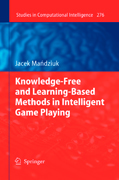
Knowledge-free and learning-based methods in intelligent game playing
Mandziuk, Jacek
The book is focused on the developments and prospective challenging problems in the area of mind game playing (i.e. playing games that require mental skills) using Computational Intelligence (CI) methods, mainly neural networks, genetic/evolutionary programming and reinforcement learning. The majority of discussed game playing ideas were selected based on their functional similarity to human game playing. These similarities include: learning from scratch, autonomous experience-based improvement and example-based learning. The above features determine the major distinction between CI and traditional AI methods relying mostly on using effective game tree search algorithms, carefully tuned hand-crafted evaluation functions or hardware-based brute-force methods. On the other hand, it should be noted that the aim of this book is by no means to underestimate the achievements of traditional AI methods in game playing domain. On the contrary, the accomplishments of AI approaches are undisputable and speak for themselves. The goal is rather to express my belief that other alternativeways of developing mind game playing machines are possible and urgently needed. provides a comprehensive overview of Knowledge-free and learning-based methods in intelligent game playing INDICE: Part I AI tools and state-of-the-art accomplishments in mind games.- Foundations of AI and CI in games. Claude Shannon's Postulates.- Basic AI methods and tools.- State of the art.- Part II CI methods in mind games. Towards human-like playing.- An overview of Computational Intelligence methods.- CI in games - selected approaches.- Part III An overview of challenges and open problems.- Evaluation function learning.- Game representation.- Efficient TD training.- Move ranking and search-free playing.- Modeling the opponent and handling the uncertainty.- Part IV Grand challenges.- Intuition.- Creativity and knowledge discovery.- Multi-game playing.- Summary and perspectives.
- ISBN: 978-3-642-11677-3
- Editorial: Springer
- Encuadernacion: Cartoné
- Páginas: 260
- Fecha Publicación: 01/04/2010
- Nº Volúmenes: 1
- Idioma: Inglés
